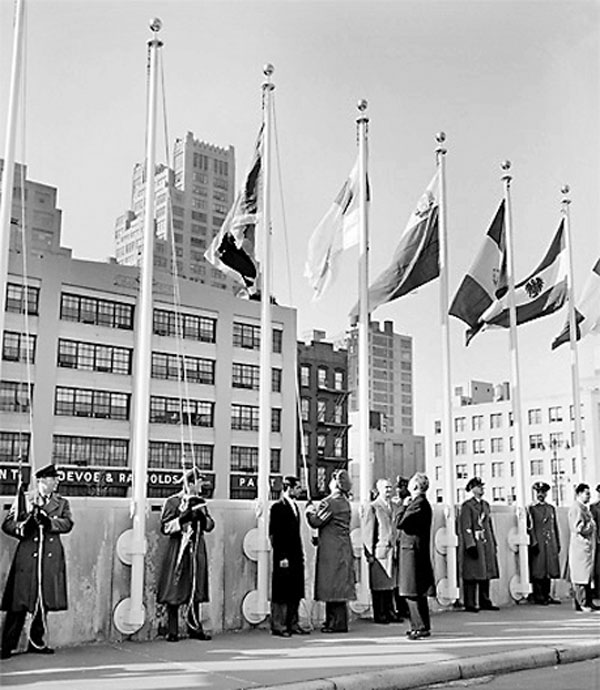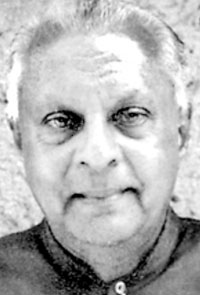News
How Esmond worked out a package for Lanka’s UN membership
View(s):September 29 marks the 38th anniversary of the death of eminent press baron, lawyer and political kingmaker Esmond Wickremesinghe, the father of President Ranil Wickremesinghe.
Mr. Wickremesinghe played a key role in Sri Lanka gaining membership in the United Nations, navigating tough obstacles which were byproducts of the Cold War between the United States and the Soviet Union. We reproduce here an article written by Ernest Corea 18 years ago when Sri Lanka celebrated its 50th year as a United Nations member.
By Ernest Corea

Sri Lanka's national flag was ceremoniously hoisted in the UN precincts following the country's admission as a UN member state back in December 1955.
Wickremesinghe had an innate “feel” for international relations, which was supplemented by almost encyclopaedic knowledge. He was, moreover, charming, polished, and relentlessly persuasive. Supported by R.S.S. Gunewardene, Sri Lanka’s ambassador to the US, he crafted a ‘package deal” that could enable a number of countries which had previously been denied the welcome mat to join the UN together. He then did what was considered almost impossible: he negotiated full support for the “package” from both veto-wielding superpowers. He was back in Colombo when Sri Lanka was formally admitted to the UN, and was the first to inform Kotelawela. An elated Prime Minister promptly offered Wickremesinghe a knighthood which the latter equally promptly declined. The knighthood went to Gunewardene, who became Sir Senerat.
Kotelawela was disappointed that his own ministry was not first off the mark to inform him of the country’s admission to the UN. “They must be asleep, he added for good measure. S.W.R.D. Bandaranaike would also refer, subsequently, to sleeping habits in Colombo when he addressed the UN, an interesting coincidence.
Kotelawela did not get to make a planned “grand entry” at the UN, because the UNP was swept aside by a political landslide in 1956. Bandaranaike, the new Prime Minister, had that honour, briefly heading the country’s delegation at the ‘56/’57 session of the UN General Assembly, the first full session in which Sri Lanka participated as a member nation. That was, sadly, his first and only appearance at the UN. He was very much at home in the UN setting and looked forward to many return visits.
In 1956, Sri Lanka’s Foreign Ministry, part of the Prime Minister’s portfolio, was a small operation, and the foreign service lacked the numbers, experience, and expertise that it now has. So the first delegation from Sri Lanka to the UN included professionals from outside the foreign service – A.B. Perera, D.W. Rajapatirana, and Badi-ud-din Mahmud – assisted by foreign service officers. It was a competent delegation, despite its inexperience at the UN.

Esmond Wickremesinghe
Initially, Sir Senerat served concurrently as ambassador to the US as well as Permanent Representative to the UN. An effervescent political “pro” from the independence generation of national politicians, he was completely at home in the diplomatic environment, both bilateral and multilateral. Personally, he was a living, working definition of charm and affability.
Sri Lanka’s outpost in New York (technically, its “mission”) was separate from but worked in collaboration with the embassy in Washington. The mission was small, but it was effective, with strong leadership and a great team spirit. Arthur Basnayake, a career diplomat, was the anchor at the mission in New York. D.A. (Algy) de Silva, if | remember aright, was posted to Washington at the time, and was in many ways the working link between the two “outposts”. Before long, the need for legal expertise at the mission became quite clear, and Neville Kanakaratne was seconded from the Attorney General’s Department in Colombo. That appointment launched Neville on a lifelong diplomatic career. One of the first tests the mission faced was Bandaranaike’s visit. Everybody at the mission came through the test with great success.
The mission was supported in many ways by Sri Lankans who were already established in New York. Among those I remember well were Thevarajah Buell, Ivan Nicolle, Ruby Saly, Dhanapala Samarasekera – and the Dean of the “community,” Lawrence Goonetilleke. No system has yet been devised by which the depth and breadth of Lawrence Goonetilleke’s generosity to his fellow human beings can be measured.
Emotions ran high at the ‘56/’57 sessions of the UN General Assembly over such issues as the British-French-Israeli assault on the Suez Canal and the former Soviet Union’s intervention in Hungary. Both events were considered capable of setting off a world war. Bandaranaike came to the UN direct from New Delhi where a conference of Asian Prime Ministers discussed these issues. His analyses and prescriptions were, therefore, awaited with great interest.
He spoke ex tempore, marking a significant change from the usual practice of visiting dignitaries reading out from pre-packaged texts. He took positions that reflected the trend towards non-alignment that was emerging as the dominant foreign policy thrust of many newly independent states. These attitudes had not been fully articulated, and he sought to make the UN understand the context in which non-aligned countries viewed events that exercised the world body.
Many observers expected him to explain why Sri Lanka, decisive in its voting on resolutions connected with the Suez Canal situation, had abstained from voting on a key resolution that dealt with Hungary. He saw an undue haste among those who wanted to bring the Hungarian issue to a vote. In Sri Lanka’s case, the request for voting instructions arrived at night when he could not even get the foreign ministry open. “We are rather respectable people in Colombo. We go to bed fairly early and we remain there till morning,” Bandaranaike added.
Others in the delegation spoke with clarity and, at times, vehemence, on issues such as decolonisation, global economic inequities, empowerment of the poor through education, and democratic rights. These were considered peripheral issues at the time, but the Sri Lankan delegation showed great foresight in emphasising them as they have since developed into dominant international concerns.
Sir Senerat was succeeded by Sir Claude Corea during whose tenure Sri Lanka was elected to (non-permanent) membership of the Security Council. Many distinguished Sri Lankans, from the foreign service, as well as from other professions, followed, representing Sri Lanka at the UN with distinction, as permanent representatives as well as in different capacities.
(Mr. Ernest Corea who
was Sri Lanka’s ambassador to the US is a consultant in Washington
DC. He was the first Sri Lankan newsman to cover a full session
of the UN General Assembly with
Sri Lanka as a member)
The best way to say that you found the home of your dreams is by finding it on Hitad.lk. We have listings for apartments for sale or rent in Sri Lanka, no matter what locale you're looking for! Whether you live in Colombo, Galle, Kandy, Matara, Jaffna and more - we've got them all!

